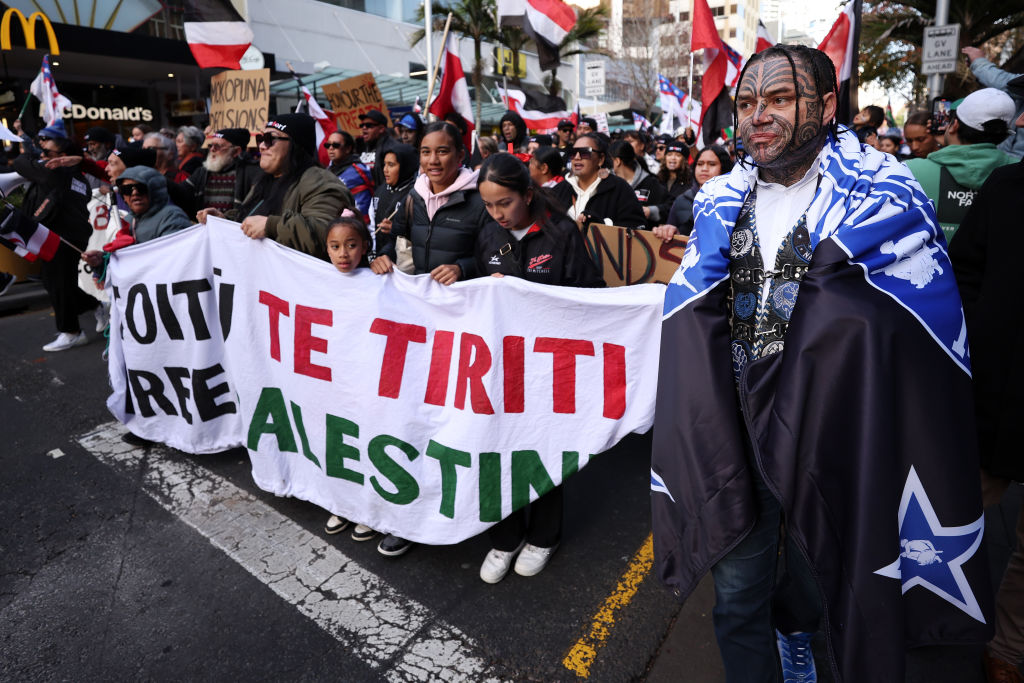Protests are underway against the contentious bill.
One of New Zealand’s governing parties has introduced legislation that could prove to be the most contentious of this government’s term.
The libertarian ACT Party, which governs in partnership with the much larger centre-right National Party, and the minor nationalist NZ First, has pushed to define clearly the three clauses of the Treaty of Waitangi.
Considered the founding document of New Zealand, the Treaty was signed in 1840 in an agreement between the British Crown and many (but not all) Māori chiefs.
For decades, it played no significant role in lawmaking or the courts, but over recent decades it has come to guide the relationship between the Crown in New Zealand (embodied by the government), and Māori.
How a Separate Body of Rights for Māori Developed
In 1975, the Waitangi Tribunal was established to rule on claims by Māori iwi (tribes), and enact the “intent” of the original document.
The process has always been controversial because the Treaty has two versions: one in English and one in Māori, and they do not say exactly the same thing.
For this reason, the law requires the Tribunal to “decide issues raised by the differences between them.”
As a consequence, there is now almost 50 years of case law dealing with land rights issues, as well as unique rights for Māori different from the rest of the population.
While the Tribunal has no power to seize and transfer ownership of any private property, it can order the Crown to pay compensation where it finds that property was taken in breach of the Treaty.
The final decision on whether to do so, however, rests with the government of the day.
Over time, decisions of the Tribunal and the courts (on appeal) have shaped a large volume of common law around Māori entitlements under the Treaty.
But as tribes began to make claims on areas outside their traditional lands—one decision found that Māori had an interest in radio spectrum, even though it was unheard of in 1840—opposition to this approach began to mount among some sections of the population.
Attempts to Curb Judicial Activism
The Treaty Principles Bill attempts to define the Treaty’s terms according to the meaning “at the time they signed it.”
ACT Leader David Seymour said it was important the principles of the Treaty be clearly established.

“Either Parliament can define them, or the courts will continue to meddle in this area of critical political and constitutional importance,” he said in a statement.
“The purpose of the Treaty Principles Bill is for Parliament to define the principles of the Treaty, provide certainty and clarity, and promote a national conversation about their place in our constitutional arrangements.”
Later, he told reporters that the Bill “provides an opportunity for New Zealanders—rather than the courts and the Waitangi Tribunal—to have a say on what the Treaty means.
“Did the Treaty give different rights to different groups, or does every citizen have equal rights? I believe all New Zealanders deserve to have a say on that question,” he said.
Little Appetite from Coalition, But Protestors Still Concerned
However, ACT’s coalition partners, National and NZ First, have indicated that they will only support its first reading.
That means it will be referred to a Select Committee for public submissions and will return to Parliament for debate but will not pass into law when finally voted upon.

But it’s that “national conversation” that has opponents undertaking a nationwide protest march from the top of the North Island and bottom of the South, ending up in Wellington.
They claim that—even with the Bill condemned to fail—the ACT’s push to have a Select Committee review the Treaty could provide a platform for “anti-Māori” sentiment.
One of the organisers of the march, Eru Kapa-Kingi, said it was occurring in response to several decisions made by the government which amounted to “outright attacks on te iwi Māori.”
“That is what [the Treaty] protects: it protects our right to govern and determine our own lives … so when we say Toitū te Tiriti [honour the Treaty] that is what we are protecting and that is what we are saying is forever.”
The march is expected to arrive at Parliament on Nov. 19.

